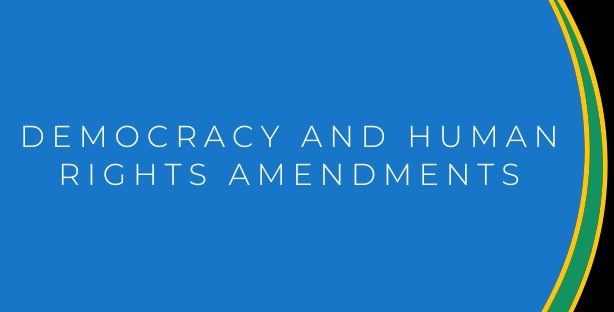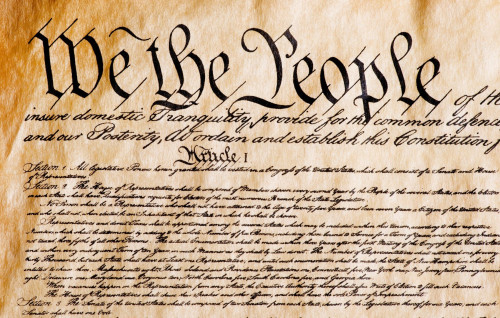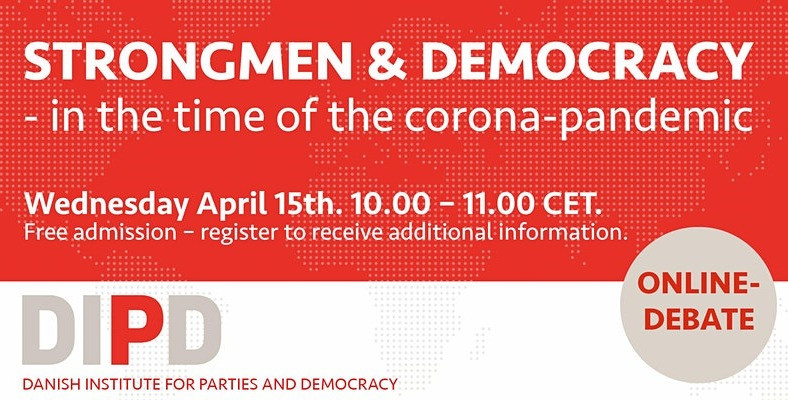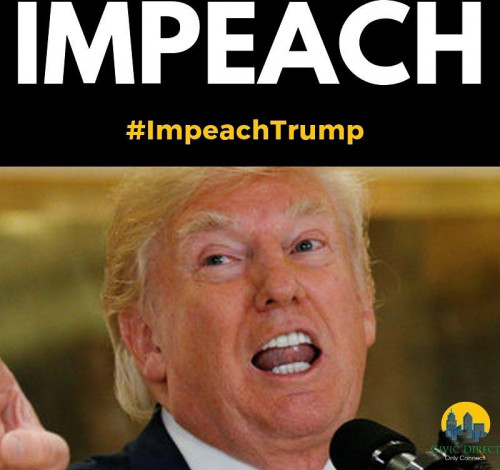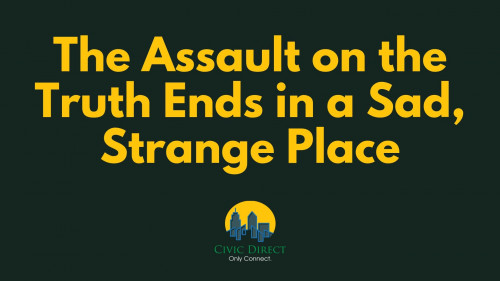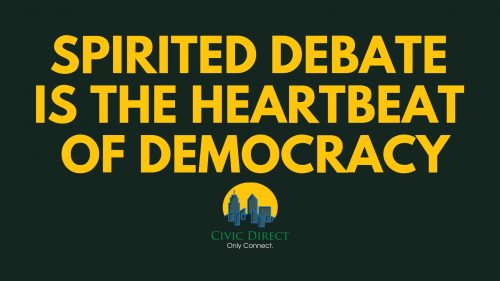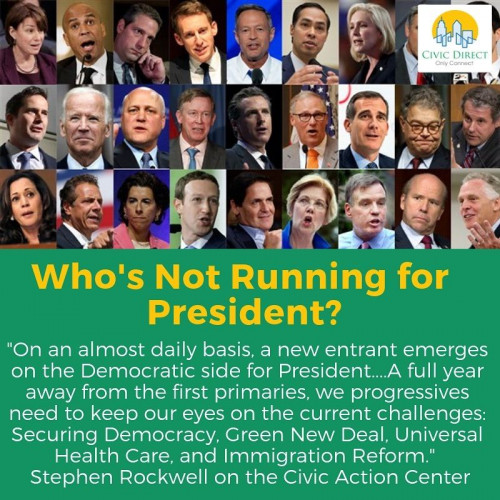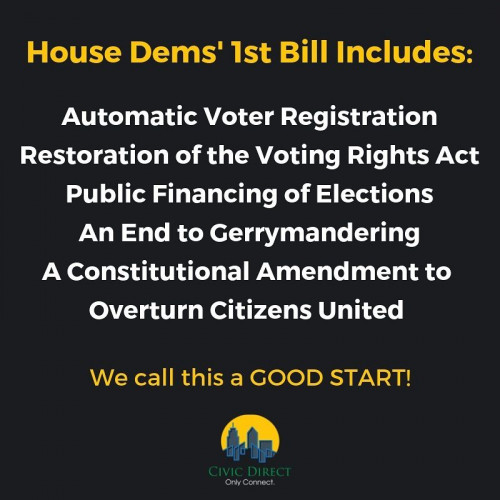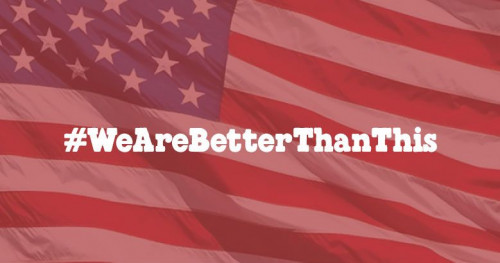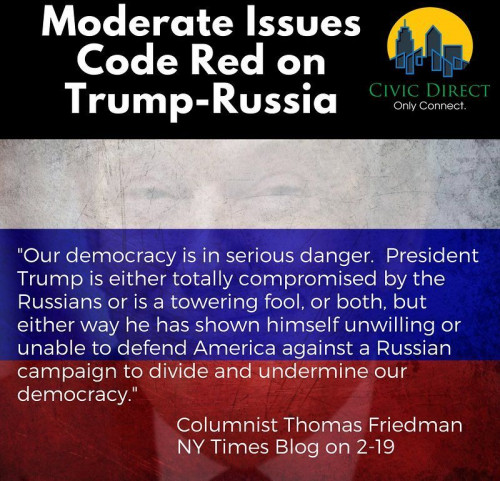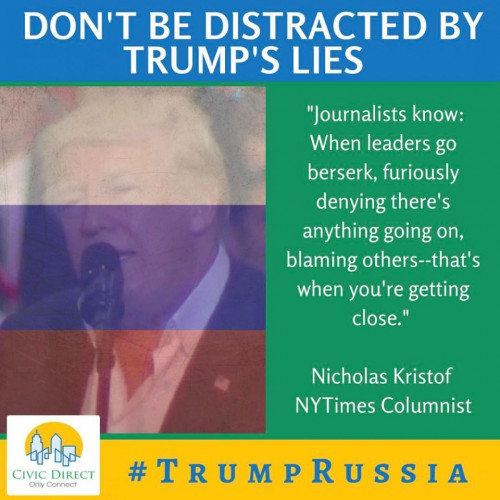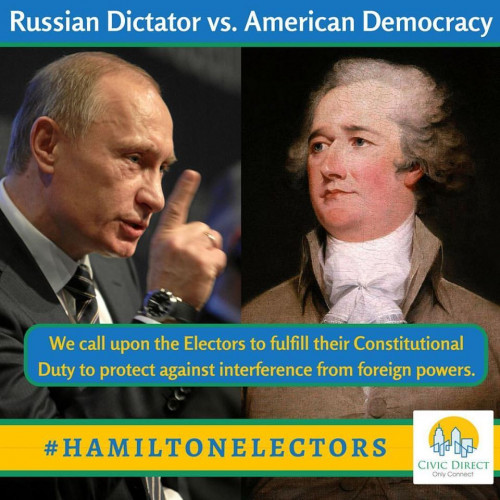The last two weeks a radical right wing Supreme Court radically transformed American life in all the wrong ways across a broad array of issues: women's rights, environmental regulations, gun safety, immigrant rights, indigenous rights, housing, public health, and protecting people from police violence. The conservative majority made decisions to take away fundamental rights and in other cases the Court stripped away legislation and regulation that the overwhelming majority of Americans desire and demand. The Supreme Court fed every right wing ideological bent undermining their own legitimacy and with it, the foundations of our democratic republic. Our democracy does not consistently represent the will of the people in any branch of government creating a crisis of legitimacy in the eyes of its citizens.
The ongoing January 6 hearings remind of us how razor thin close we were to a dictatorship. This reality is sadly reinforced by a Republican Party within which support for the outcome of dictatorship far outweighs the voices of reason fair and free elections. We are living in times when it is courageous and notable for Republicans to simply voice support for the basic tenets of democracy and the longstanding norms and functions of the Constitution.
The moribund state of American political parties are not just an issue for one side. We should be rightfully concerned about the fecklessness of the Democratic Party establishment that finds great difficulty in prosecuting traitors who led an insurrection and refuses robustly and politically to ostracize enablers and supporters of would be autocrats. The Democrats seem to look the gift horse of hold majoritarian positions on most issues in the mouth, failing time and again to advocate forcefully and to implement the will of the people.
The challenges of our day require more than the political wrangling of normal politics, of the promise of winning the next election. The current situation requires a fundamental rethinking Quite simply: a republic that consistently can not deliver what the majority of its citizens want must certainly be doomed. Fundamental change is required. We must change the Constitution.
Organizing for Constitutional change will not be easy, but doing so will have much bigger, long-term payoffs. As future ancestors, we owe our children and their children to look beyond the politics of today to fix what is fundamentally broken in our democracy. Each successive generation of Americans have expanded the meaning of democracy and human rights in the foundational document of our government. It is now our turn.
How do we make Constitutional change?
Article V of the Constitution provides two ways to propose amendments to the document. Amendments may be proposed either by the Congress, through a joint resolution passed by a two-thirds vote, or by a convention called by Congress in response to applications from two-thirds of the state legislatures. Then 3/4 of the convention or 3/4 of the states must ratify an Amendment. The barriers to Constitutional changes are high, but the pressing needs for this government to evolve are that much higher.
I would argue that we need to combine multiple amendments focused on restoring and building a functioning democracy and extending the original Bill of Rights, equal protections, and other rights amendments to a more robust, modern view of human rights. Passing amendments is a laborious process, so let's have the states look at ten together in a new Constitutional Convention or series of votes in state legislatures to apply and then vote on the amendments.
Here is a rough sketch of what the ten Democracy and Human Rights Amendments might entail.
An Amendment That Already Passed (Amendment XXVIII) - Equal Rights Amendment (Join Our Organizing Group)
ERA has already been passed by the requisite number of states and needs Congress to pass an act that eliminates the original deadline which ended in 1982. The amendment read as follows:
Section 1. Equality of rights under the law shall not be denied or abridged by the United States or by any State on account of sex.
Section 2. The Congress shall have the power to enforce, by appropriate legislation, the provisions of this article.
Section 3. This amendment shall take effect two years after the date of ratification.
New Amendment 1 (Amendment XXIX) - Abolish Electoral College; Elect President and Vice-President by Popular Vote (Join Inaugural Organizing Group)
This amendment would abolish the electoral college and make the election of President and Vice-President solely based on the popular vote. Every state and every citizen would be equally important in electing the leader of the country. Five of the Supreme Court justices were nominated by a President who did not win the majority of votes so of course the Court will not represent the will and interests of the majority of Americans.
New Amendment 2 (Amendment XXX) - Washington DC Statehood Amendment (Join Inaugural Organizing Group)
Washington DC will receive statehood for representation purposes, including voting members of both chambers of Congress based on apportionment laid out in the Constitution. Washington DC has a higher population than Vermont and Wyoming and is in the same range of states like Alaska and the Dakotas. We have a lot of Americans that are simply not represented in the political system.
New Amendment 3 (Amendment XXXI) - Term limits for the elected representatives, judges and officers of the United States Amendment (Join Inaugural Organizing Group)
Term limits are controversial, but the nation finds itself in a current state where the older generation holds much of the power and is making decisions that adversely affect the succeeding generations. To engender a more active citizenry we need some churn in positions of power and authority. An initial take on term limits follows:
- House of Representatives - 12 years (6 total terms)
- Senate - 18 years (3 total terms), no more than 20 years for those who took office mid-term.
- Federal judges including Justices of the Supreme Court - 20 years in any one position.
These term limits allow qualified and responsive leaders to make their way through successive degrees of responsibility while not becoming entrenched in any one power center. In the legislative bodies, it allows leadership positions to be better tied to merit as opposed to seniority.
New Amendment 4 (Amendment XXXII) - Majority Vote Amendment and Rules for the appointment and confirmation of federal judges and justices of the Supreme Court (Join Inaugural Organizing Group)
In short, we have to make the Senate rules fair and representative of the majority of citizens. This amendment addresses the major deficiencies of Senate rules and norms, many of which have already been undermined by the current generation of Senators. Given the break of protocol and tradition that Sen. Mitch McConnell displayed with Supreme Court justices in not giving Merrick Garland a hearing in early 2016 and promptly reversing course with Amy Coney Barrett much later in the election year of 2020 and given some of the holding up of judicial appointments, the Constitution needs to spell out clearly the process and require that the Senate hold up and down votes on Presidential appointees to the bench within a certain specified period of time, perhaps a period of 3-4 months. If that time overlaps with the next administration, the appointments should not be made or voted upon. Senate rules have already changed those votes to majority votes and its time to enshrine majority rule in the Senate and end the filibuster for all voting. Super-majority voting means almost nothing gets done: good, bad, or otherwise. Returning majority rule to the "world's greatest deliberative body" would make the Senate a better legislative body.
New Amendment 5 (Amendment XXXIII) - Congressional Apportionment Amendment (Join Inaugural Organizing Group)
It is time to more evenly base the Senate on population On Senate apportionment, the issue is that we have a small number of citizens in the smallest states with much more power than citizens from larger states. One way we might apportion Senators is that the smallest 10-15 states receive one Senator, that the bulk of states still receive 2 Senators and that the 10-15 largest states receive 3-5 Senators based on population. We can maintain the ethos of federalism and the relative size of the Senate while being more representative of the people.
This amendment would also outlaw gerrymandering that both parties have used and codify nonpartisan processes for states to establish Congressional districts.
New Amendment 6 (Amendment XXXIV) - Limit Money in Politics Amendment (Join Inaugural Organizing Group)
The Citizens United decision needs to be overturned through an amendment. The unlimited money in politics means wealthy voices and the voices of corporations hold much greater sway in our politics than they should. Politicians spend much of their time fundraising and being responsive to these monied interests. The Constitution should give Congress and the states full power to prescribe contribution limits and should take away corporate personhood for the purposes of campaign contributions.
New Amendment 7 (Amendment XXXV) - Voting Rights Amendment (Join Inaugural Organizing Group)
No Congressional act or state may pass laws that obstruct citizens from voting, including those who have been previously found guilty of a crime. This amendment should also make Election Day a national holiday and should instruct Congress and the states to make laws to make it easy as possible to vote.
New Amendment 8 (Amendment XXXVI) - Bodily Autonomy Amendment (Abortion Rights) (Join Inaugural Organizing Group)
With the overturning of Roe vs. Wade, we need to enshrine abortion rights into the Constitution so that the can be no legislation or judicial edicts that take away decisions that must be made by women and in cases of issues of health, with the health care provider.
New Amendment 9 (Amendment XXXVII) - Health Care Rights Amendment (Join Inaugural Organizing Group)
The expansion of human rights must include the right to health care, not just emergency ambulatory care. "Promoting the general welfare" in the preamble to the Constitution and the principle of "life, liberty, and pursuit of happiness" enshrined on the Declaration as natural rights that must be guaranteed starts with health and access to health care. This amendment would give Congress and the states just the authority, but the responsibility to ensure that every American has adequate access to health care.
New Amendment 10 (Amendment XXXVIII) - Life Amendment (Gun and Armaments Regulation) (Join Inaugural Organizing Group)
This amendment would clarify the well-regulated militia clause of the second amendment would state clearly that the Congress and the states do in fact have the power to regulate firearms and other weapons, that weapons of war should not be available for individual or local police use, and that the right to bear arms is not absolute.
These Democracy and Human Rights Amendments taken individually and collectively could transform our country to be the kind of nation that most of us want it to be, where the Democratic norms of majority rules and fair representation are further enshrined in the Constitution and that we commit the government of the people to the people's 21st century collective understanding of human rights. Passing these amendments would better position the country to be the kind of place that we want our children and grandchildren to grow up in. Let's get to work in organizing for this desperately needed change.
From here on, this website, We The People, is dedicated to building a movement to passing these and other democracy and human rights amendments to the Constitution that emerge from the movement. If any of these amendments speak to you, join those individual groups. If you have ideas about what should be included in those amendments, or want to suggest others, please do so. If you would like to work to organize states to have conventions and to put pressure on Congress, please join the overall Organizing Group for the Democracy and Human Rights Amendments
#wethepeople #constitution #democracyandhumanrightsamendments #dhra #democracy #humanriights #abolishelectoralcollege #dcstatehood #votingrights
Impeachment. The process has finally begun.
We all thought that the Mueller investigation would make a clear case for impeachment, but there was too much reading between the lines in his long thesis. His presentation to Congress was uneven to the point of impotence, surprisingly for a man of such stature. Or perhaps putting kids in cages and separating from their parents, violating fundamental human rights, would have been perceived by the political establishment as a high crime. Bush blew past the Geneva Conventions on torture with no repercussions, so no dice on kids in cages as a rationale for impeachment. Instead, Trump openly admitted to colluding with a foreign power to dig up dirt on a political opponent who was engaged in the 2020 political campaign. Trump forced the reluctant hand of Nancy Pelosi to act on impeachment of a despicable President.
Even for those who look at American institutions with a healthy skepticism given its uneven record on producing political outcomes that represent the will of the majority while protecting the rights of the minority, the impeachment is vitally important to the future of the republic. There is a lot more at stake than getting rid of Donald Trump, a hollow man who fills the deep void of his being with the very worst human emotions that most of us try to avoid. His narcism requires anger, spite, and hatefulness as fuel and corruption and corrupting those around him to serve his ego and his financial interests comes as second nature. His corruption has seeped into the institutions and basic norms that have allowed the United States to function, however imperfectly, as the longest standing Constitutional Republic in human history.
Getting rid of Trump is thereby the first, and most immediately necessary, step in de-corrupting our system of government. We need to do so not because we like or dislike Trump, but because we have some fealty to the rule of law and a deep appreciation of the separation of powers laid out in the Constitution. Any institutional healing process will need to further expunge lawless Trump appointees, reversal of norm-shattering policies, and the establishment of new constraints on the power of future Presidents to behave in such a manner.
Before Trump, we took our institutions and the rule of law largely for granted. Yes, there were politics, often nasty in their attempts to sway public opinion, but much of what our civics classes taught us held true. There was some sense of permanence to the notion of the United States and its 3 co-equal branches of government, competing institutions that balance power. Trump's actions have shown thus far that this system is actually a good deal more fragile. Bad actors who show little respect for others and the norms that history and good practice built. Compromised players in the system will offer little resistance and find themselves complicity in destroying the institutions and relationships that they once held so dear.
Of course, Trump is not purely an anomaly and is largely a creation of the times. Money has so inundated the political system it has often drowned out the notions of representative democracy. If corporate and big money donors can have their say with representatives who do their will and not the will of the people who voted for them, we have broken the system. The twentieth century saw the rise of an Imperial President who has an incredible amount of power rapped up in the leadership of the Defense and Intelligence agencies. The War Powers Act and other Congressional and Judicial decisions tried to maintain some balance, but it is clear that the Executive Branch has gotten out in front of the other 2 branches of government. And let us not forget the Mitch McConnell as minority and majority leader of the GOP in the Senate has instituted a scorched earth politics that have undermined the basic norms of the "world's greatest deliberative body," going so far as to steal a seat on the US Supreme Court.
These issues need to be corrected so that the system never produces a viable candidate for President with such autocratic proclivities. But it all starts first with upholding the rule of law and maintaining the basic integrity of our elections. The Republicans will need to choose how they want history to be written about themselves, what legacy they want to impart to their children and grandchildren. They need to be able to answer the basic question of every generation, did you leave it better than the way you found it? There is little doubt that the Democrats will impeach because the case has already been made public by Trump himself. The real question is will the system of checks and balances hold? Will Republicans fulfill their obligations with history and future generations looking on?
Impeachment. The time has come. Is this political generation up to the challenge or will they fail again?
Politics #trump #impeachtrump #democracy
"..And would it have been worth it, after all,
Would it have been worth while,
After the sunsets and the dooryards and the sprinkled streets,
After the novels, after the teacups, after the skirts that trail along the floor—
And this, and so much more?—
It is impossible to say just what I mean!
But as if a magic lantern threw the nerves in patterns on a screen:
Would it have been worth while
If one, settling a pillow or throwing off a shawl,
And turning toward the window, should say:
“That is not it at all,
That is not what I meant, at all.”
The Love Song of J. Alfred Prufrock by T.S. Eliot
Have you ever lived in a dictatorship? I have and it feels strange for someone who group up in a democratic republic. There are almost always two realities that people live in. One reality is similar to the reality I know where people live their lives expressing their thoughts freely. The other less familiar reality is beyond the line where free speech is drawn, expressing thoughts about the royal family. Fealty to the autocrat or the royal family comes almost second nature. Praise in the form of a love of a parent is often expressed. Criticism is either projected onto some other source for the problem or delivered with a double entendre that could easily be explained away as referencing some thing other than the dictatorship. Indeed the Chinese living under the Communist Party have become quite adept at this double meaning speak on social media. Where is truth in all of these leaps of logic and word games? Truth can purposefully difficult to ascertain with controlled narratives by autocrats and loyal subjects who have been conditioned to deprioritize truth to the point where its pursuit has lost much value.
The Diminishing Importance of Truth in American political life.
The American Press has nearly always had a muckracking strain going back to the founding of the Republic. The Progressive Era ushered in a new professionalization of journalism with standards for truth-seeking and truth-telling as we would recognize them today. The same generations that valued good government, relatively more equal economic outcomes, eliminated de jure racial segregation also created a journalism industry committed to getting the story right, challenging those in power for answers, and pursuing an investigative path in order to ascertain the truth. These public services are widely viewed as essential elements to the functioning of a democracy.
All of politics is filled with the stretching of truth and the presentation of facts and arguments beneficial to your side of the argument. A free press referees such discourse, fact checking and challenging leaders and those who aspire to leadership. As mass media arose, progressive era sensibilities ensured that there would be rules to the road for such fair play and truth seeking. In 1949, the Federal Communications Commission (FCC) published the "Fairness Doctrine," which called for two important principles for those who held licenses to broadcast on public airwaves"
(1) that every licensee devote a reasonable portion of broadcast time to the discussion and consideration of controversial issues of public importance; and
(2) that in doing so, [the broadcaster must be] fair – that is, [the broadcaster] must affirmatively endeavor to make … facilities available for the expression of contrasting viewpoints held by responsible elements with respect to the controversial issues presented.
Furthemore...
The personal attack rule stated that when personal attacks were made on individuals involved in public issues, the broadcaster had to, within one week of the broadcast, notify the person attacked, provide him with a copy of the broadcast (either script or tape), and allow him an opportunity to respond over the broadcaster’s facilities.
The political editorial rule required that when a broadcaster endorsed a particular political candidate, the broadcaster was required to provide the other qualified candidates for the same office (or their representatives) the opportunity to respond over the broadcaster’s facilities.
(Congressional Research Service)
Why did we lose these principles to truth seeking?
We lost these principles and practices for a number of reasons:
- A move away from good government/journalism - as political ideology became the over-riding impetus of political life, the scorched earth political discourse (mostly though not exclusively from the Right) meant many were willing to bust the social norms necessary for good government and journalism to exist.
- Reagan's FCC ended the Fairness Doctrine - This move away from valuing balanced journalism came directly from Reagan's FCC which did away with the Fairness Doctrine in 1987.
- Cable TV not beholden to the Fairness Doctrine - Fox News was created a couple of years later. As a cable entity, they would have likely not been held to the Fairness Doctrine, but they could have felt pressure from other credible media sources who were participating in such processes, especially those around endorsing candidates and making political attacks.
- Rise of internet social media - Distributed media and information sources creates the space to say anything and to quickly share unverified or blatantly false content.
Where Do We Find Ourselves in Relationship to Truth?
Al Gore wrote a book called the Assault on Reason in which he described our current sad state of political discourse and the disregard of science and rational thought in our politics. He was in some ways decrying his victimization by the blowhards of conservative talk radio or the yellow journalism of Fox News that confronted him whether in his failed Presidential bid or in his efforts to convince climate skeptics of the science behind climate change. The Fox Newsification of a third of the electorate set the stage for a large group of Americans to deprioritize truth to maintain ideological and theological position that fails to hold up to the scrutiny of truth. Trump laid a claim on this audience demanding that in many cases they sacrifice long-held conservative values, in addition to forgoing a commitment to the truth, all for allegiance to him personally.
While he assault on truth didn't start with Donald Trump, his personalization of its adherents is new as is the scale and scope of his disregard for the truth The Washington Post noted last week that Trump has lied an astounding 10,000 times in his Presidency. His followers seem immune to the constant churn of lies big and small. While some lies may seem inconsequential, the assault on truth matters, whether about his inauguration crowd-size or his most claim that doctors are committing infanticide by killing live babies when speaking about abortion. Folks are being asked to believe what their very eyes are telling them is untrue. If you can convince the public to do so, you have created the fertile ground for an autocracy.
Indeed, the hardcore Trump supporters exhibit the very same phenomenon that I witnessed in the dictatorship. They will not speak ill of him. They compromise themselves, their integrity, and their own truth. How many choose this path and how many of us are willing to fight these attacks on truth with vigor over a sustained period of time will determine how the republic moves forward, and whether we will in fact maintain our democratic nature. If we falter, we will live in a sad, strange place that hardly resembles democracy, where we trade our integrity and ability to speak freely. Living in a world of lies to support a dictator, we will be left to say only to ourselves.
“That is not it at all,
That is not what I meant, at all.”
#factionalization #tribalism #democracy #ronaldreagan #reason #journalism
The ideas of tribal beings.
The human condition is one of conceptualizing and sharing ideas. The unique identity of each human means that our conceptualization of reality will differ across individuals. From the early cave paintings to the notion of human rights, human beings ability to posit and consider various conceptualizations of the world is what largely sets us apart from our fellow travelers on Earth.
Humans are also well beyond social beings that we see in a variety of species, but rather have as distinguishing characteristic, a tribal element to their condition. Humans can and do organize themselves around a shared idea with a multitude of others who share the same idea and with whom many have never met. These organizing ideas for tribes can be the cause of great accomplishments, from the construction of the Great Pyramids to sending humans to the moon. Tribally-embraced ideas can also stir great passions by their adherents, passion that can boil over to violence when confronted by another tribe with a different set of conceptualizations of the world.
Interestingly, it is often the more ideologically or geographically similar tribes that have the most passionate disagreements. The ethnic/religious and other tribal disagreements can be the most terrifyingly intense between those who know each other well, as opposed to engagements where there is little commonality in perspective. For example, the theological and military wars between Catholics and Protestants or Sunni and Shia experienced greater intensity in our human history than inter-religious wars between the Christians and Muslims. The devil you know is usually worse than the devil you don't know.
Spirited debate is the heartbeat of a democracy.
Humans still immerse themselves in tribal violence. In the course of human existence, modern liberalism settled on democracy as a means to facilitate peaceful decision making that respects the notion that each citizen has their own distinct set of ideas about how the human social world works, and more importantly how it should work. We lived millennia in which there were little acknowledgement of the universality of our ability to conceive the world, and that we ought to respect that ability and the outputs of such thinking.
Instead of allowing tribal disagreements to break out into violence, democracy seeks to bound our disagreements and channel them to a corporate decision making of the whole. As such spirited debate is the very heart of a democracy, that debate is both a precursor to decision-making and a means to surface different ideas about what should be done.
There is an assumption wrapped up in democracy that the citizens have the intellectual development required to hold and understand facts about the biological and sociological world. Effective mass public education is required is thereby necessary to maintain a democracy, or a decision making of the whole. Facts must be established and accepted by all parties.
Our American democracy finds itself struggling on both points:
- Facts are under a constant assault by conservative media outlets making spirited debate across the political spectrum difficult as those with like views further self-isolate.
- The tribal factionalization of the American left to center-left hurts its ability to build effective movements and perform winning electioneering.
We will explore both in this series.
#Faith #Politics #democracy #progressives #tribalism #debate
So you wanna be President? Who doesn't?!
On an almost daily basis, a new entrant emerges on the Democratic side for President. Each candidate announcement sets off a range of speculation from the mass media talking heads and the social media chattering class. Rachel Maddow and Chris Hayes shift their coverage on Trump/Russia collusion and the government shutdown to allow candidates to preview their campaigns with an initial TV appearances. Twitter polls and already heated Facebook conversations speculate on the preferred candidates and which candidates are supposedly dealbreakers for their votes in a general election.
The understandable Democratic zealotry to remove Trump from office in one way or another, has potential candidates announcing earlier than in any other campaign season. This elongated campaign will invariably suck up much of the oxygen around social change activity and transfer to campaigns, punditry, and electioneering. In this series, I offer a few cautions as we head into this new period in our history.
Progressives: Steward Our Energy and Attention
A full year away from the first primaries, we progressives need to keep our eyes on the current challenges. The immediacy of the government shutdown certainly helped focus our attention to begin the new year, but there's still so much to do over the next 18 months before the fall election period. Where we do not believe we will achieve a legislative win, we can frame the issues for the 2020 election and beyond. Here's what rises to the top in terms of a legislative agenda and a framing of issues:
- Securing Democracy - HR 1 is an excellent start in confronting the political corruption from the influx of significant sums of money and addressing some of what is fundamentally broken in our democracy. Issues address include: Automatic Voter Registration, Restoration of the Voting Rights Act, Public Financing of Elections, An End to Gerrymandering, and A Constitutional Amendment to Overturn Citizens United. These measures would restore faith in the democratic process and create a more just political playing field.
- Medicare for All - Democratic Socialists of America (DSA) and other progressive coalitions are actively engaged in education and canvassing efforts, pushing the universal health care agenda. There is broad public support and multiple Democratic candidates are now on board with a measure that Bernie Sanders's first brought to the fore. We certainly must defend the gains of the ACA, encourage all states to accept Medicaid expansion. And we must continue to education why the United States should join most of the rest of the world in provide health coverage to all citizens.
- Green New Deal - There is a growing movement with new entrants like Sunrise who are lifting young voices and taking an adamant stand around the Green New Deal set of policies to fully address the impending and immediate threats of climate change. In her few weeks on the job, Rep. Ocasio-Cortez provided tremendous exposure to this agenda which also includes economic justice issues. We need to figure out in greater detail what this agenda means at state and local levels and start implementing.
- Immigration Reform - With all the talk about the the wall and border security, it would seem that there is an opportunity to put forward a new framing as opposed to just reacting to Trump administration racism and xenophobia. I hear many Democrats expressing their support for border security without fully embracing the notion that we need to be welcoming of immigrants. Immigration reform has been on the table for years, but perhaps now there is an opening to move in a bipartisan manner.
With firm control of the House and dozens of wins in state legislatures and governorships, progressive and Democrats should keep the focus on issues and making some headway.. Yes, campaigns can help amplify issues, but there is also the risk that a particular policy solution gets solely associated with one candidate and one campaign. More to come on this topic..
#Politics #democrats #president #GreenNewDeal #immigration #medicareforall #AOC #democracy #bluewave
#housedemocrats first #bill includes lots of basics, necessary for #democracy to function: automatic #voterregistration, restoration of the #votingrightsact , #PublicFinancing of #Elections, An End to #gerrymandering, A #constitutionalamendment to Overturn #Citizensunited. We call this #Goodstart!
#democrats
Week after week, Trump depraves the basic norms of our democracy and human decency.
Our smaller example happened on Friday when Trump tweeted out ahead of the employment numbers suggesting they were positive. There are of course, laws against doing so, but this also breaks a fundamental norm about the independence of the data and the departments that collect it. If the data becomes politicized, we will have less trust in the data. This is what a conspiracy theory President wants. If you can't trust the numbers and the government that produces them or the law enforcement agencies, that you will have to put your trust in him. Dictatorships start with these kind of obfuscations of reality that create fear.
The truth is that if any other President would have done a preview of the employment numbers, the news would have covered it as a major scandal and Congress would have launched an investigation with at least a hand slap admonishment that said don't do it again. The systems would have fought to protect the norm necessary for a functioning democracy. For Trump, it was Friday morning quickly to be eclipsed by further news on his starting a trade war with our allies and more foreign policy schizophrenia with an announcement that the North Korea summit was still on. Even with phrenetic schizophrenia of this President, we must make sure that any undermining of basic norms of our democracy go challenged fully. It is exhausting for sure, but I fear our failure to challenge is institutionalizing Trump's disparagement of what we need to function as a democratic republic.
And yet this tweet is nothing compared to the news that barely made the news this week. The number of deaths in Puerto Rico was seventy times the number originally reported. 4,756 of our fellow citizens died making the hurricane Maria the worst national disaster in our history. We know Trump's emergency management skills amount to throwing paper towel rolls at victims and that there are still Puerto Ricans without power 8 months later, but the Harvard University study that determined this new death toll is staggering to comprehend. A hurricane on US territory lead to more deaths that 9/11.
Activists have rightfully questioned, "where is the outrage?" Certainly, Hurricane Katrina awakened the nation's conscience about how racial disparities showed themselves in a natural disaster. George W. Bush was widely ridiculed for his poor management of the disaster and support of his ineffective FEMA chief “Brownie, you're doing a heck of a job.” Except he wasn't and the country let both of them know it. Brownie didn't last long and Katrina began the long slide of Bush's approval numbers into Sarah Palin territory. Just 13 years ago, we were better than this. We've got to be be better than this now and hold folks accountable for poor management of our government for a function that must be done well in a world where climate change ensures the frequency and severity of natural disasters to only increase.
___
We are Better Than This. And this is only getting better to the degree that we resist the degradation of our democratic norms and that we fight growing injustice.
Resistance is a marathon, a test of our civic endurance, requiring ongoing sacrifices from all of us. 50 years after his death, I'm reminded that Bobby Kennedy let us know that sacrifice is usually not one act of heroism but rather a sustained, laborious set of daily and weekly struggles necessary to make the change we want to see in the world.
We come from a people who were willing to sacrifice their comfort and willing to endure the scorn of their peers in the fight for Independence, against slavery, for women's suffrage, for basic worker rights, for civil rights, for the environment and health care. We have reached one of those moments in our history again. We can't sit idly by but rather participate fully in our resistance and build a newer world based on justice, then peace.
#trumprussia “Our #democracy is in serious danger. #trump is either totally #compromised by the Russians or is a towering fool, or both, but either way he has shown himself unwilling or unable to #defend #america #against a #russian campaign to divide and undermine our democracy.” #traitor
#Trump is lying about #Obama. Yet again, the man breaks any #norms we have as a #democracy. When the sitting President attacks the previous #President with no evidence. It is a lie intended to distract us from the closing in on the #Russia investigation. #trumprussia #impeachtrump #resistance #resist
#hamiltonelectors We call upon the Electors to fulfill their Constitutional Duty to protect against interference from foreign powers. Tag a friend who agrees. #notmypresident #nevertrump #putin #dictator #democracy #fateoftherepublic #patriots #constitution #electoralcollege

